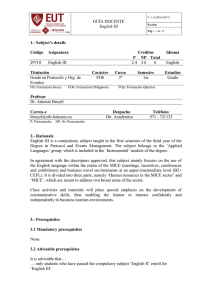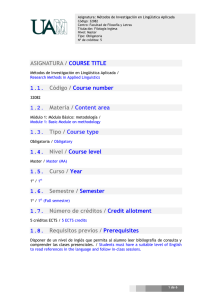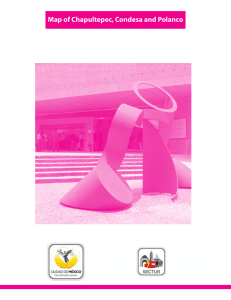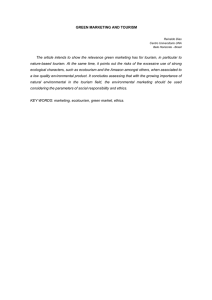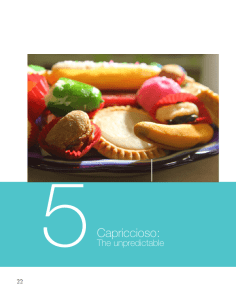Inglés III
Anuncio
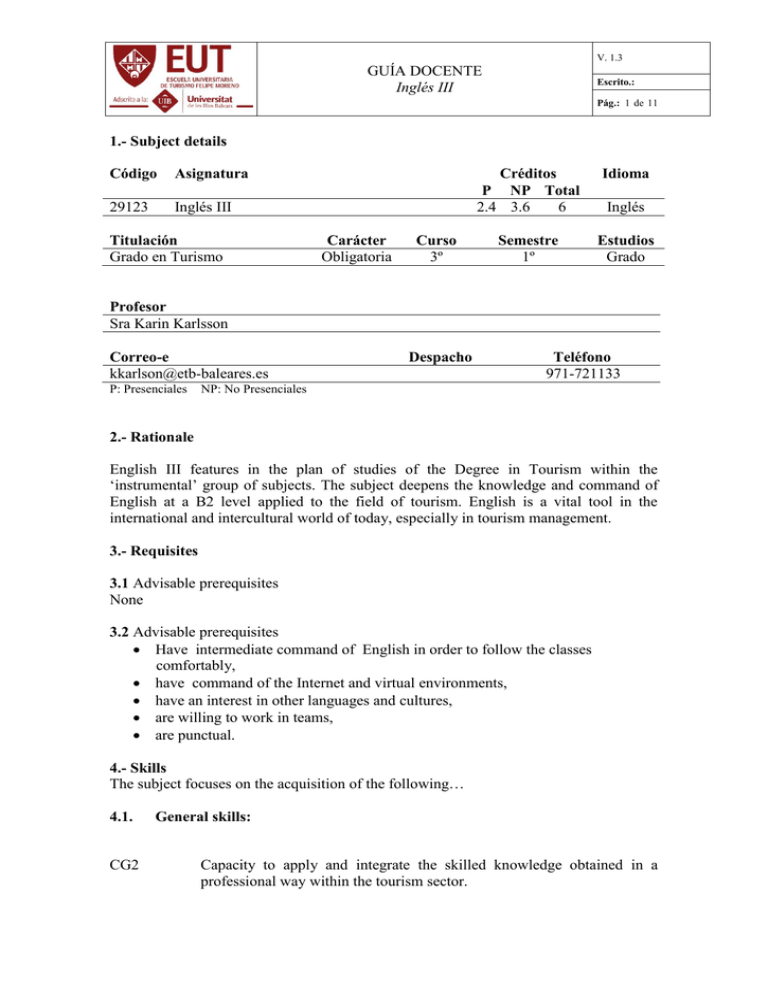
V. 1.3 GUÍA DOCENTE Inglés III Escrito.: Pág.: 1 de 11 1.- Subject details Código Asignatura 29123 Inglés III Titulación Grado en Turismo Carácter Obligatoria Curso 3º Créditos P NP Total 2.4 3.6 6 Idioma Semestre 1º Estudios Grado Inglés Profesor Sra Karin Karlsson Correo-e [email protected] P: Presenciales Despacho Teléfono 971-721133 NP: No Presenciales 2.- Rationale English III features in the plan of studies of the Degree in Tourism within the ‘instrumental’ group of subjects. The subject deepens the knowledge and command of English at a B2 level applied to the field of tourism. English is a vital tool in the international and intercultural world of today, especially in tourism management. 3.- Requisites 3.1 Advisable prerequisites None 3.2 Advisable prerequisites Have intermediate command of English in order to follow the classes comfortably, have command of the Internet and virtual environments, have an interest in other languages and cultures, are willing to work in teams, are punctual. 4.- Skills The subject focuses on the acquisition of the following… 4.1. CG2 General skills: Capacity to apply and integrate the skilled knowledge obtained in a professional way within the tourism sector. GUÍA DOCENTE Inglés III V. 1.3 Escrito.: Pág.: 2 de 11 4.2. Specific skills: CE1 Achieve enough command of the English language to perform communicative skills and apply specific tourism-related terminology at an intermediate level. CE8 Show knowledge and command of foreign languages, and achieve command of tourism-related technologies, such as collecting and analysing data, carrying out statistics, making online bookings, or conducting qualitative analyses. 5.- Course contents Unit 1 Tourism today 1.1 Changes in tourism 1.2 Skills and challenges Unit 2 NTOs 2.1 The importance of NTOs 2.2 Meetings: agenda, memos and minutes 2.3 A SWOT-analysis Unit 3 Managing tour operations 3.1 Operations and contracts 3.2 Meetings & Negotiating Unit 4 Hotel Management 4.1 The structure of the accommodation market 4.2 Managing a hotel 4.3 Human resources Unit 5 Sustainable tourism 5.1 Concepts and definitions 5.2 Ecotourism in practice Unit 6 Social Tourism 6.1 Social Tourism 6.2 Awareness, access and opportunity V. 1.3 GUÍA DOCENTE Inglés III Escrito.: Pág.: 3 de 11 6.- Teaching method 6.1. In-class activities Modality Name Grouping Description Presentation of specific lexical, grammatical and pragmatic listed in the subject’s contents. Theory classes Practical classes Content presentation Listening, reading, lang. work Large group Large group Introduction of professional skills featured in the subject’s contents. Exposure to language by maintaining English as the language of instruction Development of communicative activities at a B2 level in English for Tourism. Class work will include specific activities focused on the four communicative skills, with special emphasis put on oral and written skills within the field of Tourism. Practical classes will be completed with class exercises intended to develop the command of a wider range of grammatical and syntactic resources. Assessment Assessment Assessment 6.2. Progress-assessment tests Oral exam Final exam Large group Small group Large group Formal assessment of grammar and lexical acquisition. Students will take assessment tests on completion of the units. Oral exam consisting of the following three parts: a) reading b) guided practice (role play) c) free practice (interview) Formal assessment of written skills (writing and reading) and listening comprehension under exam conditions. Distance / self-study activities Modality Individual selfstudy Individual selfstudy Individual selfstudy Name Description Individual completion of exercises and cases set as homework on a daily basis. Daily coursework/task completion Preparation for progress assessment tests Study of lexical and grammatical contents for end-of-unit progress assessment tests Written production of range of written assignments. Written assignments V. 1.3 GUÍA DOCENTE Inglés III Escrito.: Pág.: 4 de 11 Group self-study Individual selfstudy Preparation for oral exam Study and practice of oral skills in order to role play a public relations situation proposed under exam conditions. Preparation for final exam Individual work on communicative skills to be assessed under final exam conditions. 7.- Estimated workload English II for Public Relations counts with a 40% in-class activities’ percentage, which represents a total of 60 class contact hours (i.e.4hrs. per week inclusive of assessment activities). Work load is distributed as follows: Modality In-class activities Theory classes Practical classes Assessment Assessment Assessment Name Content presentation Listening, reading, lang. work Progress-assessment tests Oral exam Final exam Distance / self-study activities Individual selfDaily coursework/task completion study Individual selfPreparation for progress assessment tests study Individual selfWritten assignments study Group self-study Preparation for oral exam Individual self Preparation for final exam study Total Hours 60 15 41.5 1.5 0.25 1.75 ECTS 2.4 0.6 1.6 0.06 0.01 0.07 % 40 10 27.6 1 0.2 1.2 90 3.6 60 60 2.4 40 6 0.24 4 8 0.32 5.3 4 0.16 2.7 12 0.48 8 150 6 100 8.- 8.- Week-by-week plan FIRST TERM Week 1 In-class activities: 2 hours (Unit 1: Tourism today) Theory classes: content presentation: 1 hr. Practical classes: listening, reading, language work: 1 hrs. Distance/self-study activities: 4 hours Individual self-study: daily coursework/task completion: 4 hrs. Week 2 GUÍA DOCENTE Inglés III V. 1.3 Escrito.: Pág.: 5 de 11 In-class activities: 4 hours (Unit 1: Tourism today) Theory classes: content presentation: 1 hr. Practical classes: listening, reading, language work: 3 hrs. Distance/self-study activities: 4 hrs. Individual self-study: daily coursework/task completion: 4 hrs. Week 3 In-class activities: 4 hours (Unit 1: Tourism today) Theory classes: content presentation: 1 hr. Practical classes: listening, reading, language work: 3 hrs. Distance/self-study activities: 4 hrs. Individual self-study: daily coursework/task completion: 4 hrs. Week 4 In-class activities: 4 hours (Unit 2:NTO’s) Theory classes: content presentation: 1 hr. Practical classes: listening, reading, language work: 3 hrs. Distance/self-study activities: 4 hrs. Individual self-study: daily coursework/task completion: 4 hrs. Week 5 In-class activities: 4 hours (Unit 2:NTO’s) Theory classes: content presentation: 1 hr. Practical classes: listening, reading, language work: 3 hrs. Distance/self-study activities: 7 hrs. Individual self-study: daily coursework/task completion: 4 hrs. Individual self-study: written assignment 1: 2 hrs. Week 6 In-class activities: 4 hours (Unit 2:NTO’s) Theory classes: content presentation: 1 hr. Practical classes: listening, reading, language work: 3 hrs. Distance/self-study activities: 8 hrs. Individual self-study: daily coursework/task completion: 4 hrs. Individual self-study: preparation for progress assessment test 1: 2 hrs. Individual self-study: written assignment 1: 2 hrs. Week 7 In-class activities: 4 hrs. (Unit 3:Managing tour operations) Assessment: Progress assessment test 1: ½ hrs. Theory classes: content presentation: 1 hr. Practical classes: listening, reading, language work: 2.5 hrs. GUÍA DOCENTE Inglés III V. 1.3 Escrito.: Pág.: 6 de 11 Distance/self-study activities: 4 hrs. Individual self-study: daily coursework/task completion: 4 hrs. Week 8 In-class activities: 4 hours (Unit 3: Managing tour operations) Theory classes: content presentation: 1 hr. Practical classes: listening, reading, language work: 3 hrs. Distance/self-study activities: 4 hrs. Individual self-study: daily coursework/task completion: 4 hrs. Week 9 In-class activities: 4 hours (Unit 4: Hotel Management) Theory classes: content presentation: 1 hr. Practical classes: listening, reading, language work: 3 hrs. Distance/self-study activities: 4 hrs. Individual self-study: daily coursework/task completion: 4 hrs. Week 10 In-class activities: 4 hours (Unit 4: Hotel Management) Theory classes: content presentation: 1 hr. Practical classes: listening, reading, language work: 3 hrs. Distance/self-study activities: 4 hrs. Individual self-study: daily coursework/task completion: 4 hrs. Week 11 In-class activities: 4 hours (Unit 4: Hotel Management) Theory classes: content presentation: 1 hr. Practical classes: listening, reading, language work: 3 hrs. Distance/self-study activities: 6 hrs. Individual self-study: daily coursework/task completion: 4 hrs. Individual self-study: preparation for progress assessment test 2: 2 hrs. Week 12 In-class activities: 4 hrs. (Unit 5: Sustainable tourism) Assessment: Progress assessment test 2: ½ hrs. Theory classes: content presentation: 1 hr. Practical classes: listening, reading, language work: 2.5 hrs. Distance/self-study activities: 6 hrs. Individual self-study: daily coursework/task completion: 4 hrs. Individual self-study: written assignment 2: 2 hrs. GUÍA DOCENTE Inglés III V. 1.3 Escrito.: Pág.: 7 de 11 Week 13 In-class activities: 4 hrs. (Unit 5: Sustainable tourism ) Theory classes: content presentation: 1 hr. Practical classes: listening, reading, language work: 3 hrs. Distance/self-study activities: 6 hrs. Individual self-study: daily coursework/task completion: 4 hrs. Individual self-study: written assignment 1: 2 hrs. Week 14 In-class activities: 4 hrs. (Unit 6: Social tourism) Theory classes: content presentation: 1 hr. Practical classes: listening, reading, language work: 3 hrs. Distance/self-study activities: 10 hrs. Individual self-study: daily coursework/task completion: 4 hrs. Individual self-study: preparation for progress assessment test 2: 1 hr. Individual self-study: preparation for final exam: 4 hrs. Week 15 In-class activities: 4 hrs. (Unit 6: Social tourism) Assessment: Progress assessment test 3: ½ hrs. Theory classes: content presentation: 1 hr. Practical classes: listening, reading, language work: 2.5 hrs. Distance/self-study activities: 12 hrs. Individual self-study: daily coursework/task completion: 4 hrs. Individual self-study: preparation for progress assessment test 2: 1 hr. Individual self-study: preparation for final exam: 4 hrs. Group self-study: preparation for oral exam: 2 hrs. Week 16 (scheduled assessment week) In-class activities: 2 hrs. Assessment: oral exam: (15 mins.) Assessment: final exam (1.45 hrs). Distance/self-study activities: 9 hrs. Individual self-study: preparation for final exam: 4 hrs. Individual self-study: preparation for oral exam: 2 hrs. V. 1.3 GUÍA DOCENTE Inglés III Escrito.: Pág.: 8 de 11 9. Assessment Type Assessment procedure Written assignments (*) NR Progress-assessment tests NR Oral exams Final exam R Use of English R Listening comprehension R Reading comprehension R Weight Assessment criteria (pathways) Variables to be assessed at a B2 level: - Language correctness - Lexical accuracy - Fulfilment of communicative task Degree of acquisition of Language structures and specific vocabulary introduced. Variables to be assessed at a B2 level: - Pronunciation - Fluency and interaction -Vocabulary range -Adequate register and style - Fulfilment of communicative task. -Acquisition of specific language structures and vocabulary introduced. -Understanding of two tourism oral texts, from various speakers at B2 level - Ability to skim (identifying main ideas) and to scan (finding specific information quickly) tourism related text at a B2 level. Total 100 R: Retrievable A B 20 20 30 -- 18 18 -- 30 16 16 16 16 100 100 NR: Not retrievable (*) NOTICE: Without prejudice to the provisions of Art. 33 of the UIB Academic Regulation (ACORD NORMATIU del dia 18 de març de 2016 pel qual es modifica l'Acord normatiu 10959/2014, de 18 de març, pel qual s'aprova el Reglament acadèmic de la Universitat) any form of fraud in the evaluation or, in particular, plagiarism (i.e. the deliberate use of someone else’s text without acknowledging its source) in the written assignments will be penalized with a ‘fail’ in the assignment where plagiarized text had been detected. 9.1 Retakes Candidates who do not pass the subject in the ordinary period of assessment will sit for a retake exam covering the activities designated as ‘retrievable’ (R). The final grade will result from averaging the grade obtained with the grades obtained during the ordinary period of assessment in the ‘not retrievable’ (NR) activities. Unless otherwise specified, the retake exam will include the following papers: Assessment procedure Oral exam Use of English Listening comprehension Reading comprehension Assessment criteria Variables to be assessed at a B2 level: - Pronunciation - Fluency and interaction -Vocabulary range -Adequate register and style - Fulfilment of communicative task. -Acquisition of specific language structures and vocabulary introduced. -Understanding of two tourism oral texts, from various speakers at B2 level - Ability to skim (identifying main ideas) and to scan (finding specific information quickly) tourism related text at a B2 level. Total Weight 18 -16 16 100 GUÍA DOCENTE Inglés III V. 1.3 Escrito.: Pág.: 9 de 11 10. Recommended bibliography, resources and additional materials. 10.1. Basic bibliography Walker, R. (2009) Oxford English for Careers: Tourism 3: student’s book, Oxford: Oxford University Press. http://www.oup.com/elt/global/products/oefc/ 10.2. Complementary bibliography Ashley, A. (2003) The Oxford Handbook of Commercial Correspondence, Oxford: Oxford University Press. Downes, C. (2008) Cambridge English for Job-hunting. Cambridge: Cambridge University Press. Duckworth, M. (2003): Business Grammar & Practice. Oxford, Oxford University Press. Goodale, M. (2005) The language of meetings. Boston: Thomson Heinle Handford, M (2010) The Language of Business Meetings Cambridge: Cambridge Univerity Press 10.2.2 Dictionaries Alcaráz Varó, E. et al. (2006) Diccionario de términos de turismo y de ocio. Inglés-Español/Spanish-English. Barcelona: Ariel Referencia. Collins COBUILD English Dictionary for Advanced Learners (3rd edition), Glasgow: Harper Collins. Diccionario Oxford Study (Spanish-English, English-Spanish), Oxford: Oxford University Press, 2006 Oxford Advanced Learner's Dictionary, Sixth Edition, Oxford: Oxford University Press ,2012. Smith, Collins et al. (2014) Collin's English Dictionary, Collins Publishers, Glasgow: Collins Publishers. 10.2.3 Dicctionaries online GUÍA DOCENTE Inglés III V. 1.3 Escrito.: Pág.: 10 de 11 http://dictionary.cambridge.org/ http://travelfurther.net/dictionaries (American-English/ English-American dictionary) http://www.thefreedictionary.com/Oxford+English+Dictionary+Online www.diccionario.com www.dictionary.cambridge.org/dictionary/business-english www.foreignword.com/dictionary/business (English-Spanish; Spanish–English) www.macmillandictionaryonline.com www.wordreference.con 10.2.3. Grammar Eastwood, J. (2002) Oxford Practice Grammar, Oxford: Oxford University Press. Hewing, Martin (2013) Advanced Grammar in Use Third edition, Cambridge University Press Murphy, R. (2012) English Grammar in Use. Cambridge: Cambridge University Press. Swan, M. (2005) Practical English Usage, Oxford: Oxford University Press. Oxford English Grammar Course: Advanced (with answers cd-rom pack) (2011). Oxford University press. 10.2.4 Grammar online http://www.edufind.com/english-grammar/english-grammar-guide/ http://www.englishpage.com/grammar/ www.better-english.com/grammar.htm (Business English Grammar Exercises) 10.3 Otros recursos 10.3.1 Aula virtual EUTFM Esquemas y apuntes complementarios Hipervínculos a sitios web recomendados. v.1.1 October 2015 CONTRATO DOCENTE EUTFM Contrato docente DATOS DEL ALUMNO APELLIDOS _____________________________Nombre__________________ DNI __________________ Curso ________ Fecha de nacimiento _________________ Población __________________________ Domicilio _________________________________________________ Teléfono _________________ Correo-e: _________________________________ DATOS DE LA ASIGNATURA Asignatura __________________________________________ Código ____________ Profesor/a responsable _________________________________ Itinerarios de evaluación propuestos: Assessment procedure Type Written assignments Progress-assessment tests Oral exams Use of English Listening comprehension Final exam Reading comprehension NR NR R R R R Total Weight (pathways) A 20 30 18 -16 16 100 B 20 -18 30 16 16 100 El itinerario por defecto será el ‘A’. Aquellos alumnos que por motivos justificados deseen acogerse a uno de los otros itinerarios propuestos, deberán firmar este contrato pedagógico. Itinerario seleccionado por el estudiante (marcad): Itinerario A - Itinerario B (*) La descripción de las actividades de evaluación se encuentra en el guía docente de la asignatura. CONTRATO ENTRE PROFESOR Y ALUMNO Los abajo firmantes acuerdan que para obtener la calificación de la asignatura, el alumno será evaluado de las actividades integradas en el itinerario seleccionado. La firma de este contrato implica el compromiso de realizar todas las actividades incluidas en el itinerario seleccionado (Firma del alumno) Palma, ___ de _____________ de 2________ (Firma del profesor/a)
